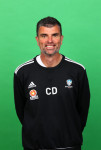Soccermetrics Interview #4: Craig Duncan (Part I)
Categories: Soccermetrics Interviews
Dr Craig Duncan is the head of Human Performance at Sydney FC. He has become an internationally-recognized authority in sports science, especially as it relates to player monitoring and maximizing the performance of elite athletes. Craig is an active Twitterer and I recommend following him there — his tweets are direct and sharp but always worth reading as a perspective on sports science and general fitness. When adidas announced miCoach, I knew that Craig would be a great person to talk to about live tracking of player fitness.
This is Part I of the interview. Part II will be available to subscribers of the Soccermetrics Newsletter on Monday.
[Interview originally conducted 3 August 2012.]
(Howard) So Craig, tell me a few sentences about yourself.
(Craig) I am based in Sydney Australia and currently work with Sydney FC which plays in our national soccer competition – the Hyundai A League. My major focus is to maximise performance of any players/athletes I work with while ensuring injury is minimised.
How did you become involved in your current career?
Prior to this present position I was primarily working as a Sport Science Academic involved in teaching and research. However, I was also consulting in football to various teams and individuals. I was approached by Sydney FC and decided it would be a good chance to see if my theories really worked in practice.
So how well have those theories held up in the field? What’s the most important thing you’ve learned so far?
I have learned that it is most important to have sound communication skills. You can have great theories that work but only if you are able to implement them. In our work it will never be textbook perfect but you must strive to communicate your philosophy effectively.
What is your definition of human performance?
Human Performance in my view is all about how the human performs in their chosen task from a physiological or psychological perspective. I do not believe the domain of “Human Performance” is only limited to sport as enhancing the performance of humans in the workplace, home environment etc may be even more worthwhile long term to society than what I do with my players or athletes.
What is the difference between sports science and sports medicine?
There is a strong relationship between both these areas and there is significant crossover. However, I think sport science is about maximising the performance of the player/athlete whereas sports medicine is about ensuring the player/athlete is healthy so their performance can be maximised. It is imperative that sports science and sports medicine work together and that this relationship is positive. Too often there is conflict between the sport scientist and sports medicine staff and if this occurs that player/athletes performance will be compromised.
I was reading some news articles from Australia, and it appears that in the Australian Football League there’s also conflict between the sport scientists and the coaching staff. Have you seen that and if so, how do you minimize that conflict?
I have no conflict with my coaching staff, it is more people in our national federation that don’t believe in sport science. This is their opinion and although I don’t agree I respect their right to have an opinion.
What do you envision to be the proper role of technology in sport in general and football in particular?
Technology plays a very important role in sport but the role of technology must be related to the maximisation of performance of the player and team rather than to satisfy the interest of the sport scientist etc. I love technology but I must always reflect on the above philosophy as it is very easy to get excited about limitless technology that really has very little impact on performance.
The major role of technology must be monitor to ensure injuries are minimised and that players are performing to their physiological potential. Technology also plays an important part in game analysis and opposition scouting.
Could you give one example of a technological innovation that has impacted a player’s on-field performance?
I believe our daily tracking with GPS ensures we are able to effectively monitor training loads so that players are not over or under trained coming into games.
Australian sport has a reputation of being driven by technological innovation. The Australian Institute of Sport is very well known internationally. Does that reputation of innovation extend to Australian soccer?
The AIS has been outstanding and has enhanced our sporting performance significantly. A number of us have had experience whether working at the AIS or the NSW Institute of sport and we have taken much of our knowledge gained in these environments into football. However, for reasons I can’t explain sport science has been ignored in recent years by our national federation.
Up to and including the World Cup in 2010 (South Africa) under the guidance of Dr Darren Burgess I fully believe we had one of the best examples of sports science anywhere in the World but times have changed. I am very fortunate at my club to have great support and I believe that we are “pushing the boundaries” in respect to sport science to ensure we maximise our players performance.
[Interview to be continued in Part II. Newsletter subscribers see it first, so why not join?]


